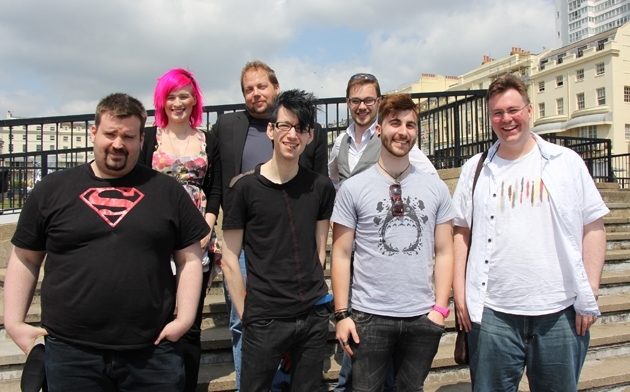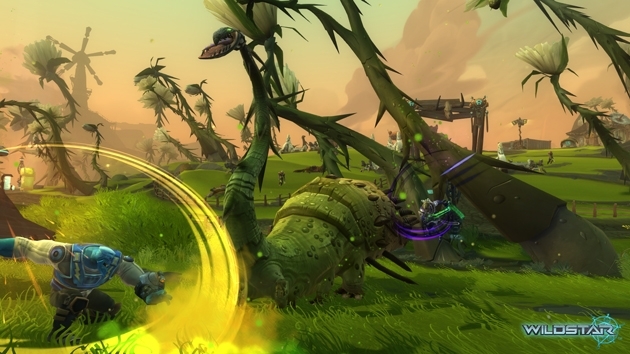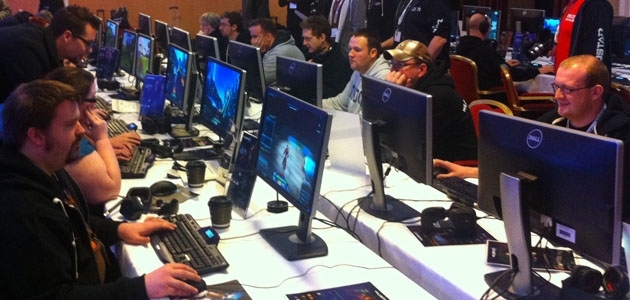WildStar: Lunch with Da Gaffer Pt 1
Carbine's Jeremy Gaffney talks with members of the WildStar UK community

If proof was ever needed about WildStar’s community outreach program, last Wednesday was it. Taking time out of his schedule at the Develop conference in Brighton, Carbine executive producer Jeremy Gaffney met with a small group of gamers representing the fledgling UK WildStar community.
Joining me at the table were Youtuber KaeyiDream, Renaise Galwind from WildStar Roleplay, Kal Holmes from WildStar Core and Edward Orr from Afterlife Gaming. Over the course of a long lunch, Gaffney gave detailed answers to a whole range of questions, from the feel of Carbine as a development studio, to subzone design and content variety.
It was so detailed, in fact, that this is only the first of three parts. UPDATE: Part two is up, covering PvP, class design, charging models and more! Part three is also up, covering an update on beta, social tools, add-ons and more.
To start, tell us a bit about Carbine and your own MMO background.
I’m executive producer, I run the studio. We’re at 240 people or something like that now so, by launch, my guestimate would be around 300. That’s the publishing and development side of things. Most of us are MMO veterans; 30% of the team are ex-World of Warcraft guys – that was the core of the team back in the day, about 20 of the seniors and leads are from there. Since then there’re folks from well, name a game, and also folks who are on their first MMO as well, because that mix of new ideas and experience is what you want in the long haul.
 My background is that I founded Turbine many years ago, which did Asheron’s Call, Dungeons and Dragons Online and Lord of the Rings Online. I was also lead programmer on Ultima Online 2, which got shot in the head in a political battle back in 2001. And then I’ve been at NCsoft ever since. I ran product development – City of Heroes, City of Villains, Guild Wars, bringing all the Korean games over here, all that kind of stuff.
My background is that I founded Turbine many years ago, which did Asheron’s Call, Dungeons and Dragons Online and Lord of the Rings Online. I was also lead programmer on Ultima Online 2, which got shot in the head in a political battle back in 2001. And then I’ve been at NCsoft ever since. I ran product development – City of Heroes, City of Villains, Guild Wars, bringing all the Korean games over here, all that kind of stuff.
With Carbine specifically, I signed up the guys who left Blizzard; I was the suit on the NCsoft side who signed the deal. And then I basically took a year off and retired briefly [laughs] which I like doing when I can enjoy it, as opposed to later on when you’re old and decrepit. Especially since the game development lifestyle probably kills you off before you get there anyway.
One of the benefits of having worked in product development in the West was you see all the games, because all the big boys want to go into Korea, and so you see all the games in development from the larger publishers. And all the small guys want money, and the benefit of NCsoft is that it’s a cash-rich company.
And so, knowing the whole state of the industry in 2007, I was like 'Man, there’s not a project I’d rather be on than this one', because it had potential. The fun art style, the personality of the game, all that was obvious back then. Great programmers who just know their stuff and the right attitudes about changing the game based on fan feedback.
Beta feedback’s just been critical to us. We make fairly large swings on what we do, based on what people say they want on the forum, and then actually trawling through the data and finding out what’s actually happening in the game. The benefit of online is that you own the world, you can see everything going on, it’s just a matter of parsing through it all to find out.
It’s refreshing to see that developers aren’t hiding behind press
 There’s this shock collar thing that sets in. When you screw up, the fans are smarter than you because there are a billion of them. Even if you’re really sharp, you’re not sharper than the million people who are going to have more time to play than you. And so, if you do something wrong, you get this shock collar Pavlovian thing. It’s either ‘don’t change stuff’, or it’s learning the wrong lessons about doing something wrong.
There’s this shock collar thing that sets in. When you screw up, the fans are smarter than you because there are a billion of them. Even if you’re really sharp, you’re not sharper than the million people who are going to have more time to play than you. And so, if you do something wrong, you get this shock collar Pavlovian thing. It’s either ‘don’t change stuff’, or it’s learning the wrong lessons about doing something wrong.
Alternately you can embrace that, accept the fact that you’re going to make the odd mistake, but build your game flexibly so that you can actually adapt to it. And part of that is listening, as opposed to waiting for the shock collar of a million fans saying ‘hey, you’re an idiot.’

It’s nice to see the industry changing toward that.
The West is lagging because, in the European and US market, the games aren’t built to be flexible. As you’re seeing in China right now, it was originally the case that most games updated on a 3 month cycle. If you don’t update after three months, you start seeing a decline in your users; get to six months and you get a huge drop off. Everybody works around a quarterly cycle to try to get the updates out.
But the industry’s moved forward. In China, a bright group out there said ‘Hey, let’s update every two months,’ and more users started heading over there. Someone else said ‘Screw that, we’ll do a month.’ And so, for the big games in China, many of them update on a weekly cycle. And it’s hard, because it’s very easy to shoot yourself in the foot.
Look at League of Legends; something new comes out every three weeks. Walk through Riot’s office and the entire company is geared around these three week updates, because nothing’s more important. And you can imagine if they stopped doing champions you’d see a tail-off. But, as it is, you’re about to quit, getting a little bored, then a new thing comes out.
So it’s monetization and attention all tied up, and they get it. Part of it is that they listen – go into their front office, and there’re monitors up with the twitter feeds of what people are saying in the game, what the results are in the game right now, and they’re live so that everybody’s aware of it.
It’s smart; more of the industry can and should move over to that. In an MMO patches are expensive and hard, and changing things without screwing up everything else is hard. You need to develop [flexibility] very early on, and I don’t see every game doing it, because, frankly, it’s frikkin’ hard to just get a game out the door, never mind being easily tuneable on the dev side, having a world that supports it, having the tech that supports it, or the processes to do it without shooting yourselves in the foot.
Has it gotten any easier with superfast internet connections and new coding methods?
It helps some, but look at how slowly the industry moves forward. Go back a decade and the largest team size that existed was probably 40 or 50 people. Now, we’ll be 300 plus by launch. You look at SWTOR, I don’t know their exact numbers but their team was 350 to 400 people, and that’s hundreds of millions of dollars in development cost. Very few people have run a 300 person team before, and run it well. Most MMOs don’t come out in less than a five year cycle, most are about 7 or 8.
 And so, by the time you’re done with that one game, do you want to sign up and do exactly the same job again, or do you want to say ‘Hey, it’s time to take a step up to the stuff I haven’t done yet.’ You’re ready for a bump after seven years on the same damn game. And so it’s very rare in a team to see people who have done well and competently in the past. That scaling makes everyone stumble a bit, because it’s not like you have a 40 year history to draw on from people who have done it before. No, everybody learned it from smacking their faces in the walls.
And so, by the time you’re done with that one game, do you want to sign up and do exactly the same job again, or do you want to say ‘Hey, it’s time to take a step up to the stuff I haven’t done yet.’ You’re ready for a bump after seven years on the same damn game. And so it’s very rare in a team to see people who have done well and competently in the past. That scaling makes everyone stumble a bit, because it’s not like you have a 40 year history to draw on from people who have done it before. No, everybody learned it from smacking their faces in the walls.
And of those people from the early days, how many people are in there and actively making games, and how many are following cargo-cult science?

Is this why you do GameJams, to get people around the office?
The reason that we do that is to spread it about. Also, Arkships are a key part of that for us; we bring people in, put them under NDA, and then show them the works. The stuff that we work on is iterative – you do stuff, if it’s fun you do more, if it’s not you do less – and the market hates that as a rule, because people want to know. But when plans change, you take a huge penalty for it because they say you’re an idiot and should know what you’re doing. Which is accurate, but it also limits innovation if you can’t do that.
 So the ability to bring people in, put them under NDA and say ‘Try that, what do you think?’ in a limited setting, works awesomely. It’s actually hard to get consistent feedback on that front, because leaks are a pain.
So the ability to bring people in, put them under NDA and say ‘Try that, what do you think?’ in a limited setting, works awesomely. It’s actually hard to get consistent feedback on that front, because leaks are a pain.
We’re a very open studio. In many ways, I don’t mind having a freely open beta. Just go in, play, if you have a good time or not, say so. That’d be brill. But the problem is that if we have a half-done tradeskill system in there, we want to announce it after we’ve spent six months iterating on it, otherwise you get all the tradeskillers saying ‘This thing sucks.’
How do you manage that in this process? Our industry hasn’t figured it out yet.
What about those people who just play without giving feedback?
We actually don’t mind the people that don’t give feedback, because we track them all. There’s a map we generate where, if someone doesn’t play for two weeks, we put a skull on it. And so if you just look at the map, all those little skulls are going to be clustered around content that sucks, that drove them out. Or maybe there are no quests in the area. Maybe our curve is wrong for levelling and it got boring there, or got too hard.
With the problem around leaks, what is the worst kept secret in WildStar?
 It’s tricky. We have a very open office environment, and so we have conference rooms named after races and classes and things that haven’t been announced. One of the things we want to do is make sure that we announce our worst kept secrets earlier rather than later. We’re going to be doing a big reveal along those lines at Comic Con, specifically about the races.
It’s tricky. We have a very open office environment, and so we have conference rooms named after races and classes and things that haven’t been announced. One of the things we want to do is make sure that we announce our worst kept secrets earlier rather than later. We’re going to be doing a big reveal along those lines at Comic Con, specifically about the races.
And so we have a nice reveal there, and then we’ll reveal more at Gamescom. We have a big list of things – what have we talked about publicly, what have we shown under NDA, what we’ve not shown – there’s something like 200 elements on the list, and we’ve probably shown 40 of them. So there’s quite a bit in terms of zones and mechanics, never mind the fact that we iterate, so it’s going to change in the next two months anyway. Having a couple of hundred hours of content means there’s quite a reveal schedule coming up.
Next Up: Journey to Endgame and Raiding Riddles on Page 2 ->




